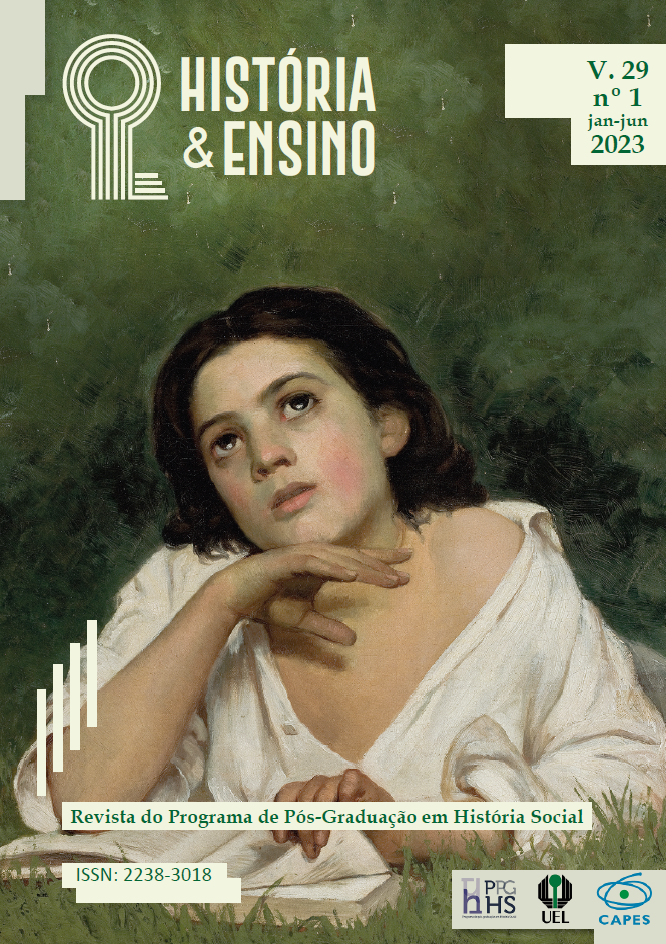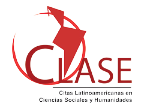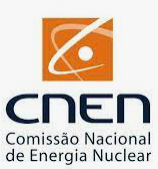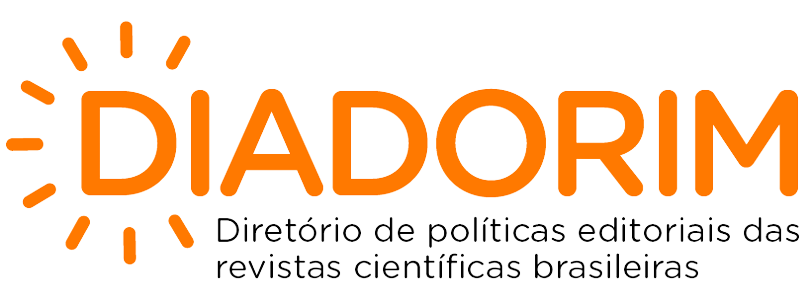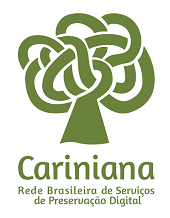On historical thinking and the history educational challenge
DOI:
https://doi.org/10.5433/2238-3018.2023v29n1p010-029Keywords:
History education, historical thinking, historicity, hermeneutics, disciplinary knowledgeAbstract
The notion of historical thinking has in recent years become popular in research on history education, particularly so in North America, the UK and Australia. The aim of this paper is to discuss the cognitive competencies related to historical
thinking, as expressed by some influential Canadian researchers, as an history educational notion from two aspects: what is historical thinking and what does it mean in an educational context, and what are the consequences of historical thinking for history education? Our discussion will focus on possible implications of this approach to history education regarding what should be taught in history classrooms and why. By focusing on the notion of historicity, we want to argue that while a focus on a more
disciplinary approach to history education is welcome, we think that more attention should be given to what could qualify as a disciplinary approach. We further argue
historical thinking and the history educational challenge should be understood as wider and more complex than what history education informed by historical thinking entails.
Downloads
References
ARENDT, Hannah. Lectures on Kant’s political philosophy. Chicago: University of Chicago Press, 1982. DOI: https://doi.org/10.7208/chicago/9780226231785.001.0001
ARENDT, Hanna. The human condition. 2. ed. Chicago: University of Chicago Press, 1998.
BIESTA, Gert. Good education in an age of measurement: On the need to reconnect with the question of purpose in education. Educational Assessment, Evaluation and Accountability, Dordrecht, v. 21, n. 1, p. 33–46, 2009. DOI: https://doi.org/10.1007/s11092-008-9064-9. DOI: https://doi.org/10.1007/s11092-008-9064-9
CARROLL, James Edward. Epistemic explanations for divergent evolution in discourses regarding students’ extended historical writing in England. Journal of Curriculum Studies, Basingstoke, v. 51, n. 1, p. 100–120, 2019. DOI: https://doi.org/10.1080/00220272.2018.1499805. DOI: https://doi.org/10.1080/00220272.2018.1499805
CLARK, Jennifer; NYE, Adele. ‘Surprise Me!’ The (im)possibilities of agency and creativity within the standards framework of history education. Educational Philosophy and Theory, Randwick, v. 49, n. 6, p. 656–668, 2017. DOI: https://doi.org/10.1080/00131857.2015.1104231. DOI: https://doi.org/10.1080/00131857.2015.1104231
CLARK, Penney; SEARS, Alan. Fiction, history and pedagogy: a double-edged sword. Journal of Curriculum Studies, Basingstoke, v. 49, n. 5, p. 620–639, 2017. DOI: https://doi.org/10.1080/00220272.2016.1238108. DOI: https://doi.org/10.1080/00220272.2016.1238108
DONNELLY, Mark; NORTON, Claire. In the service of technocratic managerialism? History in UK Universities. Educational Philosophy and Theory, Randwick, v. 49, n. 6, p. 643–655, 2017. DOI: https://doi.org/10.1080/00131857.2015.1104232. DOI: https://doi.org/10.1080/00131857.2015.1104232
FORDHAM, Michael. Tradition, authority and disciplinary practice in history education. Educational Philosophy and Theory, Randwick, v. 49, n. 6, p. 631–642, 2017. DOI: https://doi.org/10.1080/00131857.2015.1135777. DOI: https://doi.org/10.1080/00131857.2015.1135777
GADAMER, Hans-Georg; FANTEL, Hans. The problem of historical consciousness. Graduate Faculty Philosophy Journal, [New York], v. 5, n. 1, p. 8–52, 1975. DOI: https://doi.org/10.5840/gfpj1975512. DOI: https://doi.org/10.5840/gfpj1975512
GADAMER, Hans-George. Reply to my critics. In: ORMISTON, Gaile L.; SCHRIFT, Alan D. (ed.). The hermeneutic tradition: from Ast to Ricoeur. Nova York: State University of New York Press, 1990. p. 273–297.
GADAMER, Hans-George. Truth and method. 2. ed. Nova York: Continuum, 2006.
HARRIS, Richard; GRAHAM, Suzanne. Engaging with curriculum reform: Insights from English history teachers’ willingness to support curriculum change. Journal of Curriculum Studies, Basingstoke, v. 51, n. 1, p. 43–61, 2019. DOI: https://doi.org/10.1080/00220272.2018.1513570. DOI: https://doi.org/10.1080/00220272.2018.1513570
HAWKEY, Kate. A new look at big history. Journal of Curriculum Studies, Basingstoke, v. 46, n. 2, p. 163–179, 2014. DOI: https://doi.org/10.1080/00220272.2013.778331. DOI: https://doi.org/10.1080/00220272.2013.778331
HAWKEY, Kate; PRIOR, Jayne. History, memory cultures and meaning in the classroom. Journal of Curriculum Studies, Basingstoke, v. 43, n. 2, p. 231–247, 2011. DOI: https://doi.org/10.1080/00220272.2010.516022. DOI: https://doi.org/10.1080/00220272.2010.516022
HONIG, Michal; PORAT, Dan. Reading biographical texts: A gateway to historical disciplinary reading. Journal of Curriculum Studies, Basingstoke, v. 51, n. 5, p. 1-24, 2019. DOI: https://doi.org/10.1080/00220272.2019.1567821. DOI: https://doi.org/10.1080/00220272.2019.1567821
LEE, P. J. History Teaching and Philosophy of History. History and Theory, Middletown, v. 22, n. 4, p. 19–49, Dec. 1983. DOI: https://doi.org/10.2307/2505214. DOI: https://doi.org/10.2307/2505214
LÉVESQUE, Stephane. Thinking historically: educating students for the twenty-first century. Toronto: Buffalo, 2008.
LÉVESQUE, Stephane; CLARK, Penney. Historical thinking: definitions and educational applications. In: METZGER, Scott Alan; HARRIS, Lauren McArthur (Ed.). The Wiley international handbook of history teaching and learning. Hoboken: John Wiley & Sons, Inc., 2018. p. 119–148. DOI: https://doi.org/10.1002/9781119100812.ch5
LEVISOHN, Jon A. Historical thinking – and its alleged unnaturalness. Educational Philosophy and Theory, Randwick, v. 49, n. 6, p. 618–630, 2017. DOI: https://doi.org/10.1080/00131857.2015.1101364. DOI: https://doi.org/10.1080/00131857.2015.1101364
MONTE-SANO, Chauncey; COCHRAN, Melissa. Attention to learners, subject, or teaching: What takes precedence as preservice candidates learn to teach historical thinking and reading? Theory & Research in Social Education, [s. l.], v. 37, n. 1, p. 101–135, 2009. DOI: https://doi.org/10.1080/00933104.2009.10473389. DOI: https://doi.org/10.1080/00933104.2009.10473389
PARKES, Robert J. Developing your approach to history teaching. In: ALLENDER, Tim; CLARK, Anna; PARKES, Robert. (ed.). Historical thinking for history teachers: a new approach to engaging students and developing historical consciousness. Crows Nest: Allen & Unwin, 2019. p. 72–88. DOI: https://doi.org/10.4324/9781003115977-8
PERSSON, Anders. Lärartillvaro och historieundervisning: innebörder av ett nytt uppdrag i de mätbara resultatens tid. Umeå: Umeå universitet, 2017.
PERSSON, Anders; THORP, Robert. Historieundervisningens existentialiserande potential. Nordidactica: Journal of Humanities and Social Science Education, [s. l.], n. 2, p. 59–74, 2017.
PORAT, Dan A. It’s not written here, but this is what happened: Students’
cultural comprehension of textbook narratives on the Israeli-Arab Conflict. American Educational Research Journal, Washington, v. 41, n. 4, p. 963–996, 2004. DOI: https://doi.org/10.3102/00028312041004963. DOI: https://doi.org/10.3102/00028312041004963
RETZ, Tyson. At the interface: academic history, school history and the philosophy of history. Journal of Curriculum Studies, Basingstoke, v. 48, n. 4, p. 503–517, 2016. DOI: https://doi.org/10.1080/00220272.2015.1114151. DOI: https://doi.org/10.1080/00220272.2015.1114151
RETZ, Tyson. The Structure of historical inquiry. Educational Philosophy and Theory, Randwick, v. 49, n. 6, p. 606-617, 2017. DOI: https://doi.org/10.1080/00131857.2015.1101365. DOI: https://doi.org/10.1080/00131857.2015.1101365
RÜSEN, Jörn. Forming historical consciousness – Towards a humanistic history didactics. In: NORDGREN, Kenneth; ELIASSON, Per; RÖNNQVIST, Carina (ed). The processes of history teaching: an international symposium held at Malmö University, Sweden, March 5th-7th 2009. Karlstad: Karlstadts Universitet, 2011. p. 15-33.
SEGALL, Avner. Critical history: implications for history/social studies education. Theory & Research in Social Education, [S. l.], v. 27, n. 3, p. 358–374, 1999. DOI: https://doi.org/10.1080/00933104.1999.10505885. DOI: https://doi.org/10.1080/00933104.1999.10505885
SEIXAS, Peter. A model of historical thinking. Educational Philosophy and Theory, Randwick, v. 49, n. 6, p.593–605, 2017. DOI: https://doi.org/10.1080/00131857.2015.1101363. DOI: https://doi.org/10.1080/00131857.2015.1101363
SEIXAS, Peter; MORTON, Tom. The big six: historical thinking concepts. Toronto: Nelson Education, 2013.
SEIXAS, Peter; PECK, Carla. Teaching historical thinking. In: SEARS, Alan; WRIGHT, Ian. (ed.). Challenges & prospects for Canadian social studies. Vancouver: Pacific Educational Press, 2004. p. 109–117.
SHEMILT, Denis. Drinking an ocean and pissing a cupful: how adolescents make sense of history. In: SYMCOX, Linda; WILSCHUT, Arie (ed.). National history standards: the problem of the canon and the future of teaching history. Charlotte: Information Age Pub, 2009. p. 141–210.
THORP, Robert. Uses of history in history education. Umeå: Umeå universitet, 2016.
THORP, Robert. History didactical entanglements and the Cold War: a comparative study of the opening lessons on the Cold War in Sweden and Switzerland. In: CHRISTOPHE, Barbara; GAUTSCHI, Peter; THORP, Robert. (ed.). The cold war in the classroom: international perspectives on textbooks and memory practices. New York: Palgrave
Macmillan, 2019.
VANSLEDRIGHT, Bruce A. The challenge of rethinking history education: on practices, theories, and policy. New York: Taylor & Francis Group, 2010. DOI: https://doi.org/10.4324/9780203844847
WILSCHUT, Arie. Images of time the role of an historical consciousness of time in learning history. Charlotte: Information Age Pub, 2012.
WINEBURG, Sam. Historical thinking and other unnatural acts: charting the future of teaching the past. Filadélfia: Temple University Press, 2001.
YOUNG, Michael. Overcoming the crisis in curriculum studies: a knowledge based approach. Journal of Curriculum Studies, Basingdtoke, v. 45, n. 2, p. 101–118, 2013. DOI: https://doi.org/10.1080/00220272.2013.764505. DOI: https://doi.org/10.1080/00220272.2013.764505
Downloads
Published
How to Cite
Issue
Section
License
Copyright (c) 2023 Robert Thorp, Anders Persson

This work is licensed under a Creative Commons Attribution 4.0 International License.
História & Ensino adota a licença CC-BY esta licença permite que os reutilizadores distribuam, remixem, adaptem e criem a partir do material em qualquer meio ou formato, desde que a atribuição seja dada ao criador. A licença permite o uso comercial.
